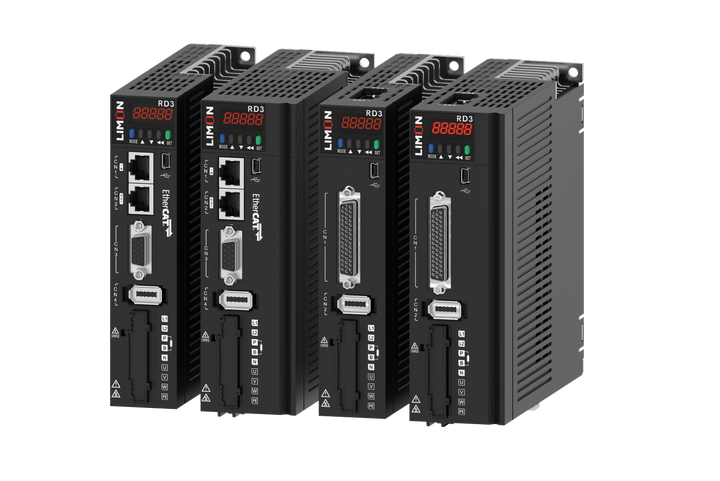Get In Touch
Welcome to discuss your purchasing requirements with our customer service.
LIMON’s new generation of high-performance servo drives delivers precise control and extensive feature configurations. Perfectly matched with our LIMON brand servo motors and linear module systems, they achieve sub-micron level position control accuracy, significantly enhancing the precision, speed, efficiency, and stability of industrial automation equipment. Covering power ranges from 100, it delivers continuous power output capability. Featuring universal compatibility and platform-based design, it supports communication protocols including RS485, CANopen, EtherCAT, and PROFINET.

Servo drives, also known as servo drivers or servo motor drivers, are advanced electronic devices used to regulate the motion of servo motors with high precision. They form the critical link between control systems and mechanical operations, ensuring accuracy, stability, and efficiency across countless automation applications.
Understanding the anatomy of servo drives is crucial to grasp their functionality. Comprising a control circuit, power amplifier, and feedback system, servo drives continuously monitor the motors’ performance, making real-time adjustments to maintain the desired position or speed. This closed-loop system enhances reliability and precision, making servo drives indispensable in applications where accuracy is non-negotiable.
Servo drives operate within a closed-loop system, starting with a user-set reference input for position, speed, or torque. The system continuously receives real-time feedback from sensors attached to the servo motor, detecting any discrepancies between the desired and actual states. A controller processes this error signal, generating a control signal that is amplified by a power amplifier. The amplified signal instructs the servo motor to adjust its output, ensuring precise and dynamic control. This iterative process maintains accuracy by minimizing errors, making servo drives ideal for applications demanding high precision and responsiveness.
Servo drives offer precise motion control, high-speed response, excellent positioning accuracy, and stability under varying loads. They enable energy efficiency, vibration suppression, and flexibility across applications such as robotics, manufacturing, printing, and semiconductor production.
Servo motors, powered by servo drives, are widely applied in automation and industrial systems requiring exact motion control. They are used in robotics for articulated movement, in CNC machinery for tool accuracy, and in conveyor systems for synchronized transport. In packaging and labeling industries, they provide fast and consistent product handling. Aerospace and automotive fields employ them for precision testing and assembly tasks. They are also vital in electronics, semiconductor manufacturing, and medical equipment, where reliability and accuracy are essential. Their adaptability makes them indispensable in industries demanding speed, precision, and efficiency.
Servo motors and their corresponding drives have become indispensable in modern automation. They are commonly used in CNC machining centers, laser cutting equipment, and semiconductor production lines, where the demand for accuracy and repeatability is critical.
With their adaptability to various protocols—such as RS485, EtherCAT, and PROFINET—modern servo drives offer seamless integration into diverse automation ecosystems.
Servo motors and stepper motors are both widely used in motion control systems, yet they differ significantly in performance and applications. Servo motors, paired with servo drives, provide closed-loop control, meaning they constantly receive feedback on their position and speed. This feedback ensures precise positioning, smooth acceleration, and efficient energy usage. They excel in high-speed, high-accuracy tasks such as CNC machining, robotics, and aerospace applications.
Stepper motors, in contrast, operate in an open-loop system without feedback. They move in fixed steps, making them simpler and more cost-effective but less precise under variable loads. Stepper motors are suitable for applications like 3D printers, basic automation devices, and small-scale robotics where moderate accuracy is acceptable.
Another distinction lies in torque performance: servo systems maintain torque across a wide speed range, while stepper motors tend to lose torque at higher speeds. Additionally, servo drives incorporate features such as auto-tuning, vibration suppression, and real-time monitoring, ensuring system stability and longer service life compared to typical stepper setups.
In summary, servo drives deliver the precision, speed, and adaptability required in advanced automation, distinguishing them as an essential component of modern industry.